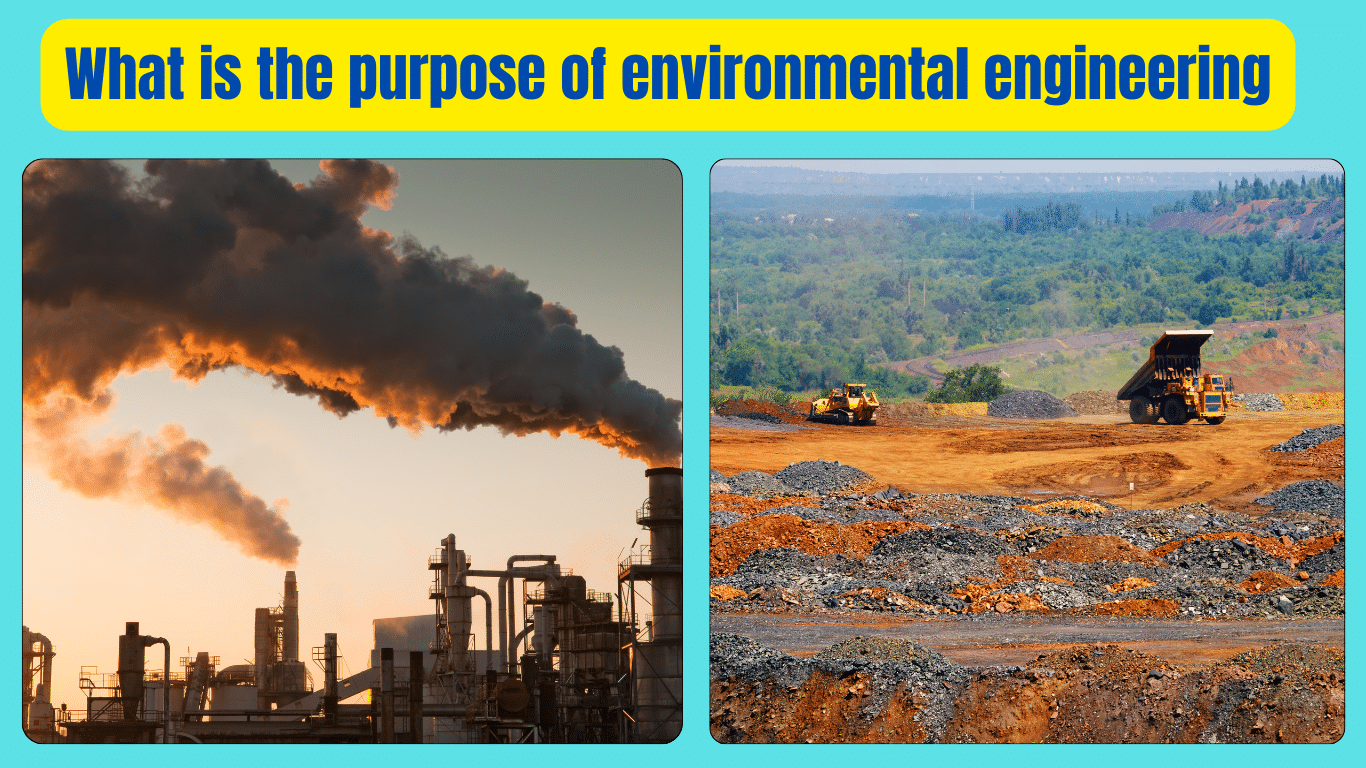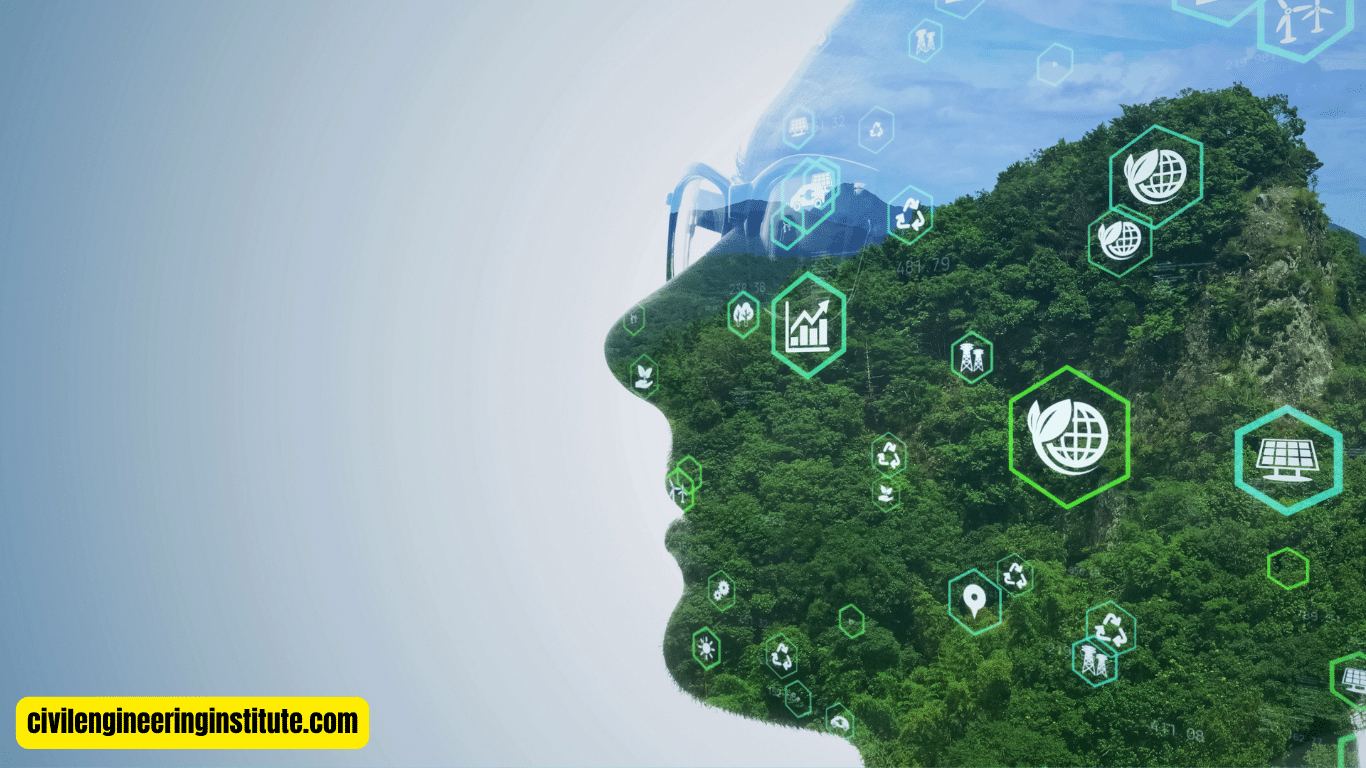The purpose of environmental engineering is to protect and improve the quality of our environment for the well-being of both people and the planet. Environmental engineers work to address various environmental challenges, such as pollution, climate change, and resource depletion. They develop innovative solutions to minimize the impact of human activities on the environment and ensure sustainable development.
Environmental engineering plays a crucial role in safeguarding air and water quality, managing waste and recycling, conserving natural resources, and mitigating the effects of environmental hazards. By integrating scientific principles with engineering practices, environmental engineers strive to create a healthier and more sustainable world for present and future generations.
Understanding the Purpose of Environmental Engineering: Building a Sustainable Future
Environmental engineering serves as a critical pillar in the quest for a sustainable future, striving to safeguard our planet’s delicate ecosystems while meeting the needs of a growing population. In this comprehensive guide, we delve into the fundamental purpose of environmental engineering, exploring its role in addressing pressing environmental challenges and shaping a healthier, more resilient world.
What is Environmental Engineering?
Environmental engineering is a multidisciplinary field that blends principles of engineering, chemistry, biology, and environmental science to tackle complex environmental issues. It encompasses a wide range of activities aimed at protecting, preserving, and enhancing the natural environment, as well as improving public health and quality of life.
The Purpose of Environmental Engineering
The primary purpose of environmental engineering is to mitigate the adverse impacts of human activities on the environment and promote sustainable development. Environmental engineers work tirelessly to develop innovative solutions that address key environmental challenges such as pollution, resource depletion, climate change, and habitat destruction.
Safeguarding Air and Water Quality
One of the core objectives of environmental engineering is to safeguard air and water quality, ensuring that essential resources remain clean and safe for human consumption and ecosystem health. Environmental engineers design and implement technologies for treating wastewater, purifying drinking water, and controlling air pollutants, thereby reducing the risk of waterborne diseases and respiratory ailments.
Managing Waste and Promoting Recycling
Environmental engineers play a vital role in managing waste and promoting recycling to minimize the environmental impact of waste disposal. They develop efficient waste management systems, design landfills, and implement recycling programs to reduce the volume of waste sent to landfills and mitigate pollution of land, water, and air.
Conserving Natural Resources
Conserving natural resources is a central tenet of environmental engineering, as it seeks to ensure the sustainable use of finite resources such as forests, minerals, and fossil fuels. Environmental engineers work to develop renewable energy sources, promote energy efficiency, and implement strategies for sustainable land use and resource management.
Mitigating Environmental Hazards
Environmental engineers are at the forefront of efforts to mitigate environmental hazards such as natural disasters, industrial accidents, and contamination events. They develop risk assessment models, design emergency response plans, and implement measures to prevent and mitigate the impacts of environmental disasters on human health, infrastructure, and ecosystems.
Promoting Sustainable Development
A key overarching goal of environmental engineering is to promote sustainable development, balancing economic growth with environmental protection and social equity. Environmental engineers collaborate with policymakers, businesses, and communities to develop strategies for sustainable urban planning, green infrastructure, and resource-efficient technologies that support long-term prosperity and well-being.
Innovations in Environmental Engineering
Advancements in environmental engineering have led to the development of innovative technologies and solutions that address pressing environmental challenges. From renewable energy systems and green building designs to bioremediation techniques and sustainable agriculture practices, environmental engineers continue to drive innovation and pave the way for a more sustainable future.
Some Key Points: What is the purpose of environmental Engineering?
Main Purpose of an Environmental Engineer
The main purpose of an environmental engineer is to protect and improve the quality of our environment. Environmental engineers work to address various environmental challenges such as pollution, climate change, and habitat destruction. They design and implement solutions to minimize the impact of human activities on the environment and ensure sustainable development. Environmental engineers play a crucial role in safeguarding air and water quality, managing waste, conserving natural resources, and mitigating environmental hazards.
Purpose of Environmental Science in Engineering
Environmental science provides the foundational knowledge and principles that underpin environmental engineering. It helps engineers understand the interactions between human activities and the natural environment, as well as the impacts of pollution, climate change, and ecosystem degradation. By integrating environmental science into engineering practice, environmental engineers can develop effective solutions to address environmental challenges while promoting sustainability and protecting public health.
Main Focus Points of Environmental Engineering
The main focus points of environmental engineering include:
- Air and Water Quality
- Waste Management
- Natural Resource Conservation
- Environmental Hazard Mitigation
Air and Water Quality: Environmental engineers work to safeguard air and water quality, ensuring that essential resources remain clean and safe for human consumption and ecosystem health.
Waste Management: Environmental engineers develop efficient waste management systems and promote recycling to minimize pollution and reduce the environmental impact of waste disposal.
Natural Resource Conservation: Environmental engineers focus on conserving natural resources such as forests, minerals, and fossil fuels by promoting renewable energy sources, energy efficiency, and sustainable land use practices.
Environmental Hazard Mitigation: Environmental engineers work to mitigate environmental hazards such as natural disasters, industrial accidents, and contamination events by developing risk assessment models and emergency response plans.
Objectives of Environmental Engineering
The objectives of environmental engineering include the following:
- Protecting Public Health
- Preserving Ecosystems
- Promoting Sustainability
Protecting Public Health: Environmental engineers aim to protect public health by ensuring access to clean air and water and minimizing exposure to harmful pollutants and contaminants.
Preserving Ecosystems: Environmental engineers work to preserve natural ecosystems and biodiversity by minimizing habitat destruction, pollution, and other human impacts on the environment.
Promoting Sustainability: Environmental engineers strive to promote sustainable development by balancing economic growth with environmental protection and social equity.
Future of Environmental Engineering
The future of environmental engineering looks promising as the world increasingly recognizes the importance of environmental sustainability. Environmental engineers will play a crucial role in developing innovative technologies and solutions to address emerging environmental challenges such as climate change, resource depletion, and urbanization. With advancements in technology and growing public awareness, environmental engineering will continue to evolve and expand its impact on creating a healthier, more sustainable world.
Basic Concepts of Environmental Engineering
The basic concept of environmental engineering is to apply engineering principles and scientific knowledge to address environmental challenges and promote sustainable development. Environmental engineers work across various sectors to develop solutions that minimize pollution, conserve natural resources, and protect human health and the environment.
Father of Environmental Engineering
Dr. Abel Wolman is often regarded as the “Father of Environmental Engineering” for his pioneering contributions to the field. He played a key role in advancing the science and practice of environmental engineering, particularly in the areas of water supply, sanitation, and public health.
Best Course for Environmental Engineering
The best course for environmental engineering typically includes a combination of coursework in engineering fundamentals, environmental science, and specialized topics such as water resources, air quality, and waste management. The preferred programs are frequently those with accreditation from reputable institutions and that provide opportunities for hands-on experience through internships or research.
Is Environmental Engineering a Good Job?
Yes, environmental engineering is considered a rewarding and fulfilling career choice. Environmental engineers have the opportunity to make a positive impact on society by addressing pressing environmental challenges and promoting sustainability. With the increasing demand for environmental expertise in various industries and sectors, environmental engineering offers excellent job prospects and opportunities for professional growth and advancement.
Conclusion
In conclusion, environmental engineering plays a pivotal role in addressing the complex environmental challenges facing our planet today. By focusing on safeguarding air and water quality, managing waste, conserving natural resources, mitigating environmental hazards, and promoting sustainable development, environmental engineers are instrumental in shaping a healthier, more resilient world for future generations. Through collaboration, innovation, and commitment to sustainability, environmental engineering offers hope for a brighter and more sustainable future.
FAQs
What is environmental engineering’s main goal?
Environmental engineering aims to protect and improve the environment’s quality for the well-being of people and ecosystems.
Why is environmental engineering important?
Environmental engineering addresses pollution, climate change, and resource depletion, ensuring a sustainable future for generations to come.
What does an environmental engineer do?
Environmental engineers design solutions to minimize environmental impact, manage waste, and conserve natural resources.
How does environmental engineering benefit society?
Environmental engineering protects public health, preserves ecosystems, and promotes sustainable development.
What are the key focus areas of environmental engineering?
Key focus areas include air and water quality, waste management, conservation, and hazard mitigation.
Who can pursue a career in environmental engineering?
Anyone passionate about protecting the environment and solving complex environmental challenges can pursue a career in environmental engineering.
What skills do environmental engineers need?
Environmental engineers need skills in engineering, science, problem-solving, and communication to address environmental issues effectively.
What advancements have been made in environmental engineering?
Advancements include innovative technologies for pollution control, renewable energy, and sustainable infrastructure design.
How does environmental engineering contribute to sustainability?
Environmental engineering promotes sustainable practices by balancing economic development with environmental protection and social equity.
What is the future outlook for environmental engineering?
The future of environmental engineering looks promising, with increasing demand for solutions to global environmental challenges and opportunities for innovation and growth.





